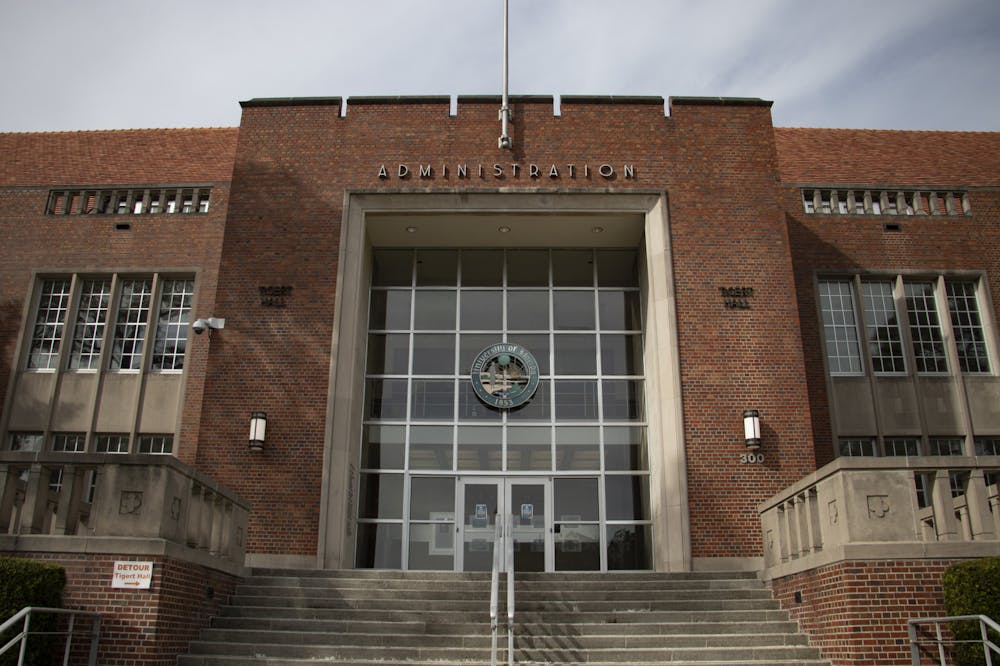UF worked for years to achieve its top five status, but one verdict could cost the university everything it strived for.
During the past few weeks, UF faced heavy scrutiny because of an administrative decision that kept three professors from providing expert testimony in a lawsuit against the state. The media coverage following the decision grabbed the attention of scholars and citizens across the country as well as its accreditor.
The Southern Association of Colleges and Schools Commission on Colleges, UF’s accreditor, opened an investigation Nov. 1.
The SACSCOC requires all its institutions to seek reaffirmation, or a review of an institution's accreditation, every 10 years. But if the accrediting association sees things outside of the reaffirmation cycle suggesting an institution is out of compliance, it follows up with the school, said John Hardt, vice president of SACSCOC.
It monitors its member institutions and can receive information outside of its normal review process, Hardt said. Information outside of the 10-year process is often brought to their attention through media reports, which is how concerns about UF’s compliance with the principles of accreditation originated.
Based on the information in media reports, UF has potentially violated SACSCOC’s standards about academic freedom and undue external influence.
When a school potentially falls out of compliance, the association writes the university a letter stating what they have read in media reports, he said. They ask the administration to send them a report showing they are still in compliance despite what appeared in the news.
The SACSCOC sent a letter to UF and is currently awaiting a response from the university disclosing its defense against the claims. It gave UF a December deadline to respond.
“We’re very much in an investigative mode,” Hardt said. “We’re not rushing to judgement; it’s in their court to respond.”
Once UF does respond, there are processes in which its response will be evaluated. Then, two things can happen: the response could be accepted into the story or it could lead to further investigation, he said.
“In this process or in the [normal] reaffirmation process, institutions are given multiple opportunities to show how they are in compliance,” Hardt said.
During these opportunities, he said, an institution could be subject to a warning or a probation period. According to the SACSCOC’s sanction policy, probation is a more serious sanction than a warning.
A school is placed on probation when it fails to make corrections to the policies they have violated. During this time, the school is strictly monitored.
This is usually the last step before the institution loses its membership. But before an institution could ever lose its accreditation it must go through each of these stages.
Though there have been schools that have lost their accreditation before, it is not common, and the process takes several years.
It is more common to see this in smaller or for-profit institutions, but it is very unlikely for something to endanger the overall accreditation at a well-established and well-respected university like UF, said Neal Hutchens, a professor of higher education at the University of Mississippi.
While unlikely, there are real consequences that affect those affiliated with schools that lose their accreditation, Hutchens said. Institutions are often forced to close after losing accreditation because their students are unable to participate in financial aid programs.
Beyond the financial implications, he said, accreditation can be used as a way to help ensure overall quality and ethical performance in institutions.
Even though he does not foresee UF losing its accreditation, Hutchens understands why the accrediting body has taken an interest in reviewing the institution.
“Florida with the University of Florida has created a top public university,” Hutchens said. “The decision on the table is, do we want to adhere to that or are we going to tear that down in the name of partisan politics.”
Contact Elena Barrera at ebarrera@alligator.org. Follow her on Twitter @elenabarreraaa.

Elena is a second-year journalism major with a minor in health sciences. She is currently the University Administration reporter for The Alligator. When she is not writing, Elena loves to work out, go to the beach and spend time with her friends and family.






